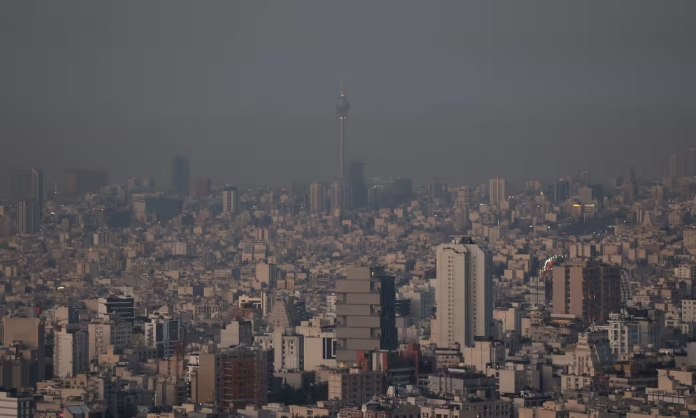The Israeli military launched strikes on military targets in Iran early Saturday morning in response to Iranian attacks earlier this month, the latest assault in a stepped-up conflict between the armed rivals.
On Saturday around 2:30 a.m. local time, at least seven explosions occurred over the capital Tehran and the nearby city of Karaj as Israeli jets struck what were described as “military targets” in the country. Despite, there were no immediate reports of destruction or casualties, state news agency IRNA reported. However, air flights on all routes have been cancelled until further notice, IRNA added.
“In response to months of continuous attacks from the regime in Iran against the State of Israel – right now the Israel Defence Forces is conducting precise strikes on military targets in Iran,” Israel’s military said in a statement.
The military later claimed to have completed “pinpoint” attacks on military targets in Iran, adding that their planes had returned home safely. The military said Israel has the right and obligation to respond to attacks by Tehran and its proxies, including missile strikes launched from Iranian territory. But the report shows that Israel sent a message to Iran on Friday before retaliatory airstrikes, warning the Iranians not to respond, Axios reported.
The Middle East has been in a special state of turmoil. The region is awaiting Israel’s response to Iran’s 1 October ballistic missile attack, in which some 200 rockets struck Israel and killed one person in the West Bank. The latest targets, however, did not include energy infrastructure or nuclear facilities, according to the US official.
Iranian authorities have repeatedly warned Israel against any attack. “Iran reserves the right to respond to any aggression, and there is no doubt that Israel will face a proportional reaction for any action it takes,” the semi-official Tasnim news agency said on Saturday, quoting sources.
Tensions have been particularly heightened since Hamas, an Iranian-backed Palestinian militant group based in the Gaza Strip, attacked Israel on 7 October 2023. Fears that Iran and the US will be drawn into a regional war have been heightened by the fact that Hamas and Iran are backed by Lebanon-based Hezbollah militants, who have been under pressure from an Israeli offensive since last month.
The US has called on Iran to halt attacks on Israel to break the cycle of violence following Israeli airstrikes on Iranian military targets in response to rocket fire. US National Security Council spokesman Sean Savett stated on Saturday: “We urge Iran to cease its attacks on Israel so that this cycle of fighting can end without further escalation. It is our aim to accelerate diplomacy and de-escalate tensions in the Middle East region.”
On the other hand, the US, seeking to prevent the conflict from escalating, also tried to assure Israel of defence assistance in case Tehran decided to launch a counterattack. Among these is Biden’s decision to move the US military’s THAAD missile defence system to Israel, as well as some 100 US soldiers to operate it.
Israeli military risks being stranded in Gaza
The death of Yahya Sinwar this month was one of the best opportunities for Prime Minister Benjamin Netanyahu to seize the chance and end the war in Gaza, but there are concerns that Tel Aviv will not seize the opportunity, according to Retired Israeli General Giora Eiland, Reuters reported. Eiland was one of many former senior army officers questioning the government’s strategy in the Gaza Strip, where earlier this month troops returned to areas in the north that had already been cleared at least twice.
“I don’t know exactly what is happening in Jabalia. But I think that the IDF (Israel Defence Forces) is doing something which is in between the two alternatives, the ordinary military attack and my plan,” he said.
Israeli troops have been operating in the northern Gaza neighbourhood of Jabaliya for the past three weeks, the third time they have returned to the city and its historic refugee camp since the war began in October 2023. Many former security officials say that rather than the Israeli military’s preferred approach of quick decisive action, the army risks getting bogged down in an open campaign that requires a constant troop presence.
Part of the operation consisted of evacuating thousands of people from the area in an attempt to separate civilians from Hamas militants. The military claimed to have removed some 45,000 civilians from the area around Jabaliya and killed hundreds of militants during the operation. However, the military has come under scrutiny for the high number of civilian casualties that have also been reported, and it has faced numerous calls to send more humanitarian aid to ease the humanitarian crisis in the area.
Since the beginning of the war, Netanyahu has maintained Israel would bring the hostages home and disband Hamas as a military and ruling force, and has no intention of remaining in Gaza. But his government never formulated a clear policy for the aftermath of the campaign. On top of that, there have been open disagreements between Netanyahu and Defence Minister Yoav Gallant for months, reflecting a broader rift between the ruling coalition and the military, which has long advocated an agreement to end hostilities and bring the hostages home.
“The situation for Israel is very precarious right now. We are sliding towards a situation where Israel is considered the de facto ruler in Gaza,” said Ofer Shelah, director of the Israel National Security Policy research programme at the Institute for National Security Studies in Tel Aviv.
The Netanyahu office announced on Thursday that Israeli negotiators would fly to Qatar this weekend to join the long-stalled cease-fire and hostage release talks. But what Hamas’ position will be and who Israel will allow to rule the enclave when the fighting stops remains unclear.
